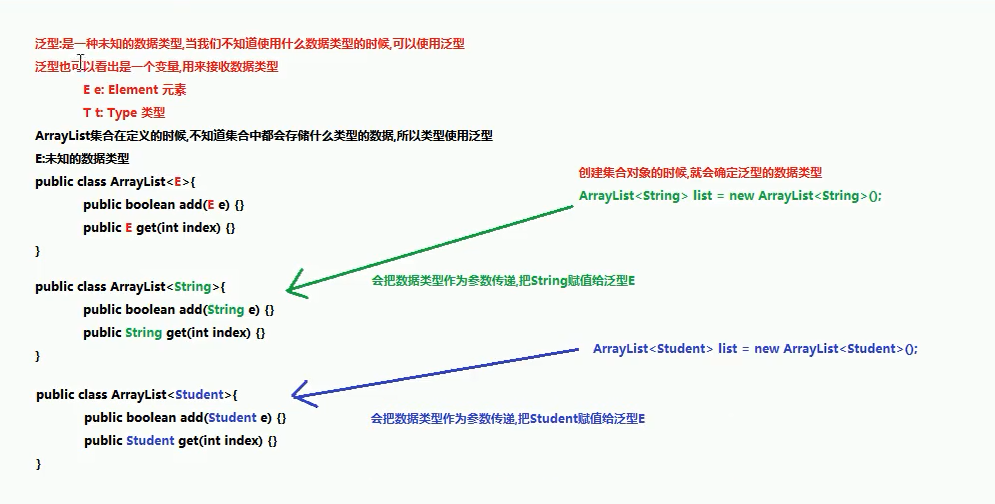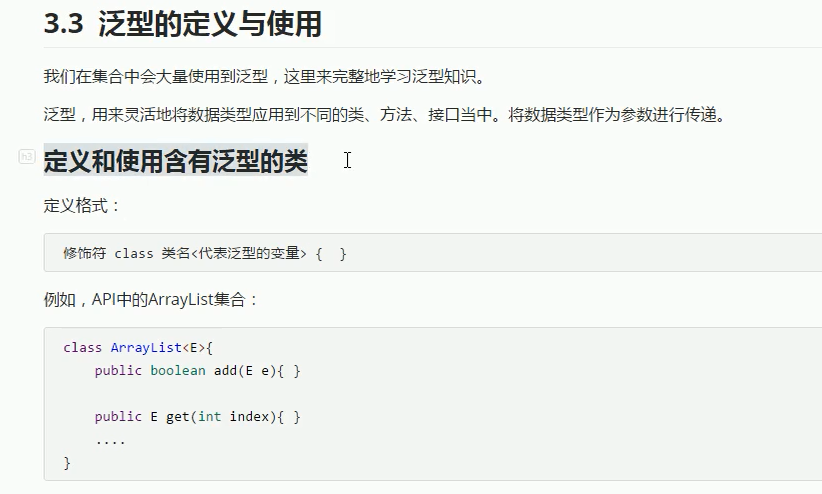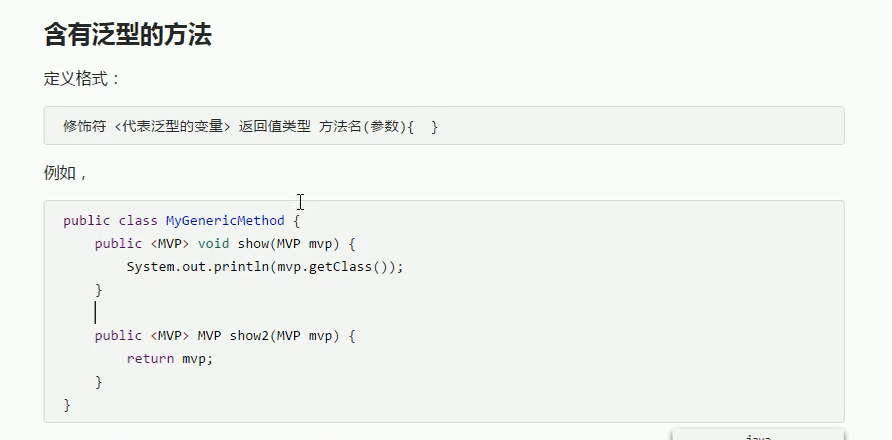01_泛型的概念

=========================================================================================================================
02_使用泛型的好处
Demo01Generic.java
package com.itheima.demo03.Generic;
import java.util.ArrayList;
import java.util.Iterator;
public class Demo01Generic {
public static void main(String[] args) {
show02();
}
/*
创建集合对象,使用泛型
好处:
1.避免了类型转换的麻烦,存储的是什么类型,取出的就是什么类型
2.把运行期异常(代码运行之后会抛出的异常),提升到了编译期(写代码的时候会报错)
弊端:
泛型是什么类型,只能存储什么类型的数据
*/
private static void show02() {
ArrayList<String> list = new ArrayList<>();
list.add("abc");
//list.add(1);//add(java.lang.String)in ArrayList cannot be applied to (int)
//使用迭代器遍历list集合
Iterator<String> it = list.iterator();
while(it.hasNext()){
String s = it.next();
System.out.println(s+"->"+s.length());
}
}
/*
创建集合对象,不使用泛型
好处:
集合不使用泛型,默认的类型就是Object类型,可以存储任意类型的数据
弊端:
不安全,会引发异常
*/
private static void show01() {
ArrayList list = new ArrayList();
list.add("abc");
list.add(1);
//使用迭代器遍历list集合
//获取迭代器
Iterator it = list.iterator();
//使用迭代器中的方法hasNext和next遍历集合
while(it.hasNext()){
//取出元素也是Object类型
Object obj = it.next();
System.out.println(obj);
//想要使用String类特有的方法,length获取字符串的长度;不能使用 多态 Object obj = "abc";
//需要向下转型
//会抛出ClassCastException类型转换异常,不能把Integer类型转换为String类型
String s = (String)obj;
System.out.println(s.length());
}
}
}
=============================================================================================================
03_定义和使用含有泛型的类

GenericClass.java
package com.itheima.demo03.Generic;
/*
定义一个含有泛型的类,模拟ArrayList集合
泛型是一个未知的数据类型,当我们不确定什么数据类型的时候,可以使用泛型
泛型可以接收任意的数据类型,可以使用Integer,String,Student...
创建对象的时候确定泛型的数据类型
*/
public class GenericClass<E> {
private E name;
public E getName() {
return name;
}
public void setName(E name) {
this.name = name;
}
}
----------------------------------------------------------------------------------------------------------------------------------------------------------------------------------------
Demo02GenericClass.java
package com.itheima.demo03.Generic;
public class Demo02GenericClass {
public static void main(String[] args) {
//不写泛型默认为Object类型
GenericClass gc = new GenericClass();
gc.setName("只能是字符串");
Object obj = gc.getName();
//创建GenericClass对象,泛型使用Integer类型
GenericClass<Integer> gc2 = new GenericClass<>();
gc2.setName(1);
Integer name = gc2.getName();
System.out.println(name);
//创建GenericClass对象,泛型使用String类型
GenericClass<String> gc3 = new GenericClass<>();
gc3.setName("小明");
String name1 = gc3.getName();
System.out.println(name1);
}
}
====================================================================================================
04_定义和使用含有泛型的方法

GenericMethod.java
package com.itheima.demo03.Generic;
/*
定义含有泛型的方法:泛型定义在方法的修饰符和返回值类型之间
格式:
修饰符 <泛型> 返回值类型 方法名(参数列表(使用泛型)){
方法体;
}
含有泛型的方法,在调用方法的时候确定泛型的数据类型
传递什么类型的参数,泛型就是什么类型
*/
public class GenericMethod {
//定义一个含有泛型的方法
public <M> void method01(M m){
System.out.println(m);
}
//定义一个含有泛型的静态方法
public static <S> void method02(S s){
System.out.println(s);
}
}
----------------------------------------------------------------------------------------------------------------------------------------------------
Demo03GenericMethod.java
package com.itheima.demo03.Generic;
/*
测试含有泛型的方法
*/
public class Demo03GenericMethod {
public static void main(String[] args) {
//创建GenericMethod对象
GenericMethod gm = new GenericMethod();
/*
调用含有泛型的方法method01
传递什么类型,泛型就是什么类型
*/
gm.method01(10);
gm.method01("abc");
gm.method01(8.8);
gm.method01(true);
gm.method02("静态方法,不建议创建对象使用");
//静态方法,通过类名.方法名(参数)可以直接使用
GenericMethod.method02("静态方法");
GenericMethod.method02(1);
}
}
=========================================================================================
来源:https://www.cnblogs.com/curedfisher/p/12424631.html